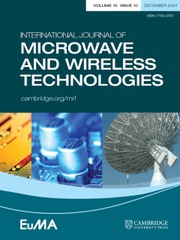Near-field microwave microscopy for the characterization of dielectric materials
Published online by Cambridge University Press: 02 September 2014
Abstract
In this paper, we present a near-field microwave microscopy method for the characterization of dielectric materials samples in the Industrial, Scientific and Medical (ISM) band. The system proposed is composed of a probe coupled to a dielectric resonator (DR) operating in the TE011 mode. Latter this is used to fix the resonance frequency of the resonator at 2.45 GHz. This system is used for the characterization of dielectric samples with accuracy and high spatial resolution, knowing that they do not have predetermined forms, but a small plane surface.The same device is used for a multi-frequency characterization (4–20 GHz) using resonance frequencies of the cavity instead of one resonance frequency of the DR.
- Type
- Research Papers
- Information
- International Journal of Microwave and Wireless Technologies , Volume 6 , Special Issue 6: Mediterranean Microwave Symposium 2013 , December 2014 , pp. 549 - 554
- Copyright
- Copyright © Cambridge University Press and the European Microwave Association 2014
References
- 1
- Cited by


